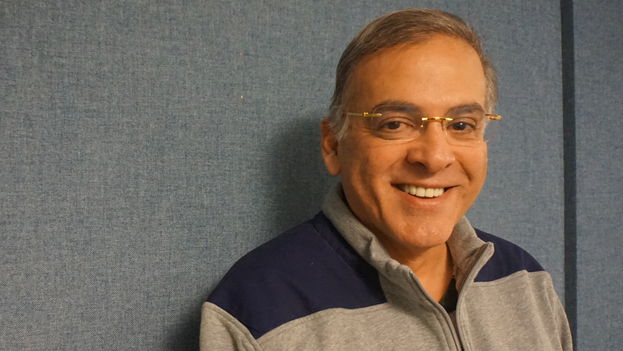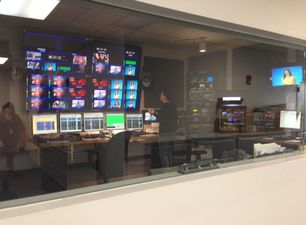
14ymedio, Yoani Sanchez, 7 November 2014 – Of all the faces that circulate on the illegal information networks, there is a very serene and well-known one that has been with us for decades. This well-spoken man who never seems to get upset has received the worst insults in the official media and the stealthy applause of those who never miss his programs. Oscar Haza spoke to 14ymedio this week at the MegaTV studios in Florida, with a baseball cap, a telephone that never stopped ringing, and many interesting stories about his life, journalism and his other adoptive island.
Yoani Sanchez: People in Cuba know you as a television presenter, but help us to complete the person behind this sober man in suit and tie who asks incisive questions. Who are you, besides a face on the screen?
Oscar Haza: I’m an ordinary person, a child from a village in the district of San Carlos, in the center of the capital city of Santo Domingo
Sanchez: Here is where many of my compatriots interrupt you and exclaim in astonishment, AH!… because you’re not Cuban!
Haza: I am the grandson of Cubans. My grandfather was Luis Felipe Haza, a Cuban who moved to Santo Domingo to work in the sugar mills. From there comes my Dominican side, but my other side is from the province of Matanzas.
Sanchez: If you were not born in Cuba where does so much passion for our country come from? Just a genetic inheritance?
Haza: In the genes, but also because I grew up in a household of fufu, ropa vieja and mangú. That special fusion that the Caribbean has produced. So the Greater Antilles has always been present in my life because of this exchange between families. The person for whom I decided to come to Miami was a Cuban-Dominican of very illustrious lineage, Henríquez Ureña. My friend Hernán Henríquez Lora got me excited and so I came here. So I’ve always had in my heart and in my baggage this interwoven history of Cuba and the Dominican Republic.
Sanchez: And journalism? Does that also come from your family tree?
Haza: My father was the first face that appeared on television, when television arrived in the Dominican Republic in 1952. Of course, to introduce, in turn, the boss.
Sanchez: Trujillo?
“I have trauma with dictatorships. (…) Trujillo removed seven members of the family of my father”
Haza: Yes, and that’s why I have a trauma with dictatorships. Although many people think I’m against the Cuban government out of convenience, because I live in Miami. It’s not that. It’s out of conviction. The Trujillo dictatorship eliminated seven members of my father’s family. So I grew up with the trauma of Latin American militarism. To the point that I don’t even have friends who know how to march. Everything it martial, everything is strict orders, I reject it. In this sense I’m a species in permanent opposition to all dictatorships
Sanchez: I have also heard you have a great music collection. Is that true?
Haza: Music is my psychiatrist. Instead of paying a psychotherapist, I buy discs … or I bought discs in another era, now no, because everything is on the internet. The music determines the mood. I listen to everything. I am a great admirer of Beethoven and Claude Debussy. The other day I had the opportunity to enjoy one of the best pianists I’ve ever heard and it was a Cuban, Jorge Luis Prats and he was playing Brahms.
But I also like dance music … I’m Caribbean! Imagine our islands: Cuba, the Dominican Republic and Puerto Rico have inspired the public to dance, the whole world.
Sanchez: And you also like reggaeton?
Haza: Reggaeton is great! No matter the genre, music is divided into good music or bad music.
Sanchez: This long involvement in the topic of Cuba, has it included a visit to the island?
Haza: I’ve been twice. The first was in 1988 and I went with the delegation of Cardinal O’Connor from New York. I went to see my father who was in Santo Domingo and I told him I was going to Cuba. So he asked me, “And that won’t cause problems for you in Miami?” “Well, I hope not because I’m going with the church,” I answered. He said, “Ah… that soothes me, because two thousand years knows more than thirty,” which was how long the system had been in power at that time.
Sanchez: You came at an interesting time, because shortly afterwards the scandal of the Ochoa case broke.
Haza: I enjoyed that trip, because I had finally come to Cuba after having heard all the versions of my grandparents, my aunts and the versions of Cuba that are here in Florida. I had a personal list to go to the neighborhoods that interested me. I did a lot of things, I interviewed Ricardo Bofill for television in the Mañana neighborhood in Guanabacoa. Then I interviewed Elizardo Sanchez in the Vibora neighborhood. It was a difficult time when there was a rupture in the Cuban opposition movement, so I interviewed the two of them.
My second trip was when the Pope went to Cuba in 1998. The experience was different, it was more irregular. Then I went to my family’s house in Matanzas, which was behind the Cathedral. It was unforgettable.
Sanchez: What has been your most difficult interview?
“What would you say if a Cuban went to Argentina to shoot and kill Argentinians?”
Haza: Mercedes Sosa. I did not know that she was suffering from depression. I had a one-hour program with her. She came, sat looking at the floor and when I asked her a question she answered only in monosyllables. I looked at the clock and it was five past eight. The program ended at nine. What do I do, I asked myself. So I said, I have to say something to get a reaction from her; then it occurred to me: “What would you say if a Cuban went to Argentina to shoot and kill Argentinians?” That woke her up and we began the interview.
I also interviewed Fidel Castro in Bogota at the Tequendama hotel, during the inauguration of Ernesto Samper. It was something sui generis because it was the day after the Maleconazo. The Air Force refused to give him military honors when he arrived for the tribute because he had been supporting the FARC and the Colombian Left. I heard about the situation, so during the interview I asked several questions about the Maleconazo and the embargo but left to end the question, “And is this your first time in Bogota after the Bogotazo?” He quickly responded to me, “Yes, and if they tell me I’m in New York I would believe it… it’s changed so much,” so he went with the tourist line.
I was also a war correspondent in Central America and lived terrible moments, like the day they killed a colleague right next to me.

Sanchez: When you do interviews with Cuban dissidents and question them about internal issues in front of the cameras, do you have a dilemma between giving arms to the government, versus not touching on these sensitive issues?
Haza: I always have that dilemma. But as a journalist it’s my job to report. We journalists are the witnesses to history. We are here to tell it. We can’t control the consequences. To opt for self-censorship would be to choose our worst enemy. Things have to be said, but with the social responsibility that we have. Our job is to reveal the truth.
Sanchez: Suppose now you’re in a TV studio in Havana, who would you like to interview there?
Haza: The job surprises me when I’ve been with people in the villages, those who have no voice, they’ve given me spectacular stories. One of the interviews I would like is with a boy or girl to know how they see the world of the adults and the Cuban reality. Children are very authentic and very honest. I would also like to interview a great poet.
Sanchez: Do you think you’ll soon be doing these interviews in Cuba?
Haza: I think so, because now those who don’t want change call themselves revolutionaries. There is nothing more anti-revolutionary and anti-dialectical than to say everything is already changed and there’s nothing to do. That is the main enemy of those who today defend the status quo. I think so, because despite the will of the ruling class changes in Cuba are close.
